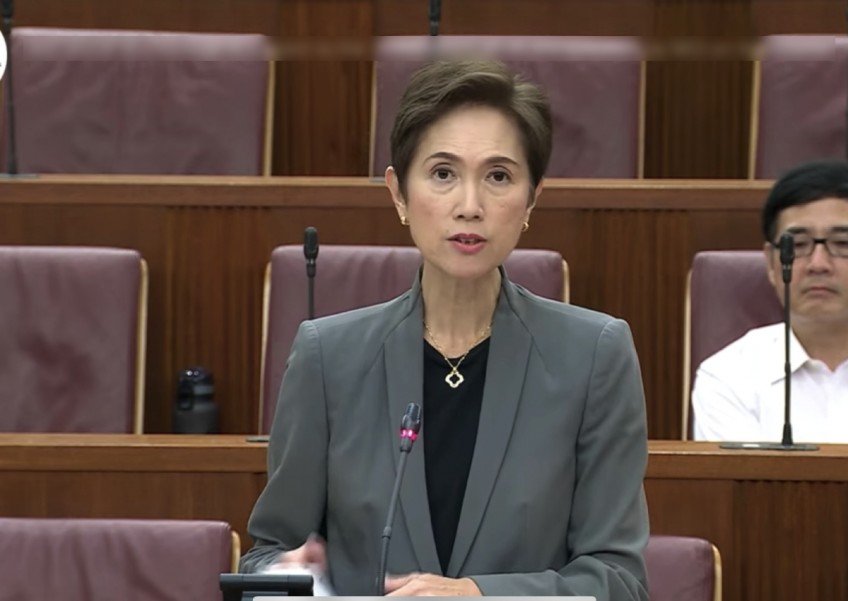Fighting SIM card fraud: New bill targets irresponsible subscribers, middlemen and errant retailers


 PUBLISHED ONApril 02, 2024 9:36 AMByClaudia Tan
PUBLISHED ONApril 02, 2024 9:36 AMByClaudia TanThink you can make easy money by providing your personal details for someone else to sign up for a SIM card?
Well, if that person is caught using the card for criminal activity, you might be in hot water.
Tougher laws may soon be imposed on those who are caught misusing and selling local SIM cards to facilitate scams.
The Law Enforcement and Other Matters Bill — which was read for the second time by Second Minister for Home Affairs Josephine Teo in Parliament on Tuesday (April 2) — targets three groups of people: irresponsible subscribers, middlemen who provide local SIM cards to scammers, and errant retailers.
In 2023, over 23,000 mobile lines were involved in scams and cybercrimes — four times the amount in 2021 — resulting in losses of about $400 million, Teo told the House.
The first group that the law has set its sight on are "irresponsible subscribers", people who give away their SIM cards or provide their particulars to others to sign up for SIM cards.
They usually do so to "earn a quick buck", said Teo.
The Minister for Communications and Information noted that a sampling study showed that close to 80 per cent of local SIM cards that were misused for crime were registered with another person's particulars.
"Armed with even just one SIM card, a scammer can do a great deal of harm," she said, citing a 2021 case where a single local mobile line was linked to 48 job scam reports, with losses amounting to around $1 million.
However, the police have had trouble taking these people to task, as they can easily claim they were unaware of the consequences of their actions.
Amendments to the bill proposes that it would be an offence for a person to hand over local SIM cards registered with his own particulars to another person, or allow his particulars to be used to sign up for a card.
"A person will no longer be able to simply claim ignorance as a defence. The law puts onus on the person to prove that he was unaware," said Teo.
Those who register SIM cards in their names for legitimate purposes, such as for family members' use will be excluded.
The proposed law will also target middlemen who possess or transfer local SIM cards that are registered with another person's particulars.
Teo made reference to a case where police identified a person who fraudulently registered local SIM cards and sent them to scammers in Malaysia.
When he was arrested, he had fraudulently registered 290 prepaid SIM cards. Although he was charged in court, he was later given a discharge amounting to an acquittal due to "evidential difficulties".
To address this challenge, a person will be deemed liable if the local SIM cards were used for crime, or if 11 or more such cards were found in his or her possession.
Infocomm Media Development Authority (IMDA) had announced earlier this year that from April 15, an individual will be allowed to purchase and register up to 10 post-paid SIM cards.
"These provisions will not only cover local SIM cards registered with other persons' particulars, but will also cover unregistered local SIM cards, as these can be easily activated by scammers using stolen credentials," said Teo.
It will also be an offence for to buy, sell or rent a local SIM card with another person's particulars.
Teo said: "As this involves an exchange of money, it is more serious than simply receiving or supplying local SIM cards.
"There is no reason why someone other than a contracted retailer should be trading local SIM cards registered in another person's particulars, in exchange for money or other benefits."
Although IMDA requires third-party retailers to implement measures to prevent fraudulent registrations, a number of them have used stolen or false credentials to register local SIM cards, which are then sold to scammers.
Recently, the police arrested four mobile phone retailers who used the particulars of their subscribers to register post-paid SIM cards. They then sold these SIM cards to customers, likely scammers, who wanted to conceal their identity.
Teo said: "Such errant retailers should be accountable. Not only do they tarnish the reputation of their peers, their actions cause many victims to suffer losses."
Under the current law, these retailers might simply lose their contacts with the mobile service provider.
To create a "stronger deterrence", Teo said, it is proposed that it will be illegal to "facilitate fraudulent registrations knowing or having reasonable grounds to believe that the SIM card will be used for unlawful purposes".
"Errant retailers may also be liable if the local SIM card is proven to have been subsequently been used for unlawful purposes."
Irresponsible subscribers and middlemen supplying SIM cards for crimes can be fined up to $10,000, or jailed up to three years, or both.
Those who who repeatedly receive, supply and possess such cards, or facilitate fraudulent registration can be jailed for up to five years, fined up to $20,000 or both for a second or subsequent offence.
As most scam syndicates operate from overseas, these laws will also apply extraterritorially, as long as there is a proven link to harm in Singapore.
READ ALSO: Man gets record $48k fine for selling Sim cards registered using customers' data without consent
claudiatan@asiaone.com